Yes, replacing a boiler is a significant job that requires careful planning and execution. You'll need to assess your current system, select a compatible boiler type, and consider installation challenges like space and ventilation. The process involves safely removing the old unit and ensuring proper connections for maximum performance. Cost considerations play a vital role, too. If you want to understand the complete process and what to expect, there's more to explore on this topic.
Key insights
- Boiler replacement involves assessing the current system and selecting the appropriate new boiler type based on efficiency and heating needs.
- The installation process can be complex, requiring proper venting, piping connections, and compliance with local building codes.
- Space limitations and existing infrastructure can complicate the installation, potentially leading to additional costs and time delays.
- Removing the old boiler safely and preparing the area for installation are critical steps that require careful planning and access clearance.
- Overall, while it can be a significant job, professional assistance can streamline the process and ensure proper installation.
Understanding the Role of a Boiler in Your Home
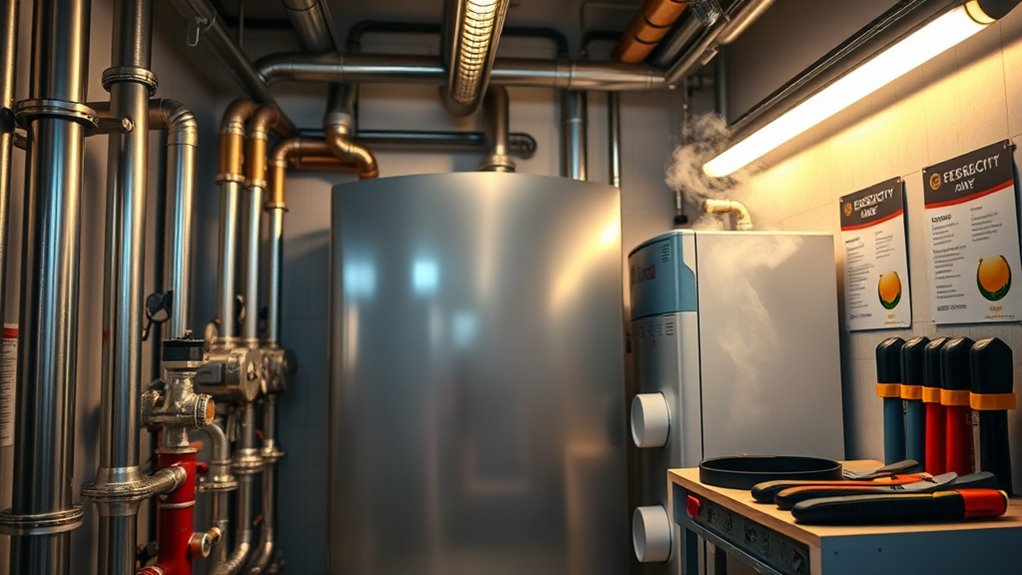
A boiler serves as the heart of your home's heating system, guaranteeing warmth and comfort during cold months. Its primary function is to heat water, which then circulates through radiators or underfloor systems, providing consistent warmth throughout your living space. By converting energy into heat, a boiler plays a critical role in maintaining your home's temperature.
When considering energy efficiency, modern boilers utilize advanced technology to minimize fuel consumption, reducing your energy bills and environmental impact. Regular maintenance enhances this efficiency, helping you avoid unnecessary costs and extend the boiler's lifespan. Understanding your boiler's function not only guarantees peak performance but also allows you to make informed decisions about upgrades and replacements when necessary. Regular servicing ensures safe and efficient operation, minimizing the risk of breakdowns and promoting longevity.
Signs That You Need a Boiler Replacement
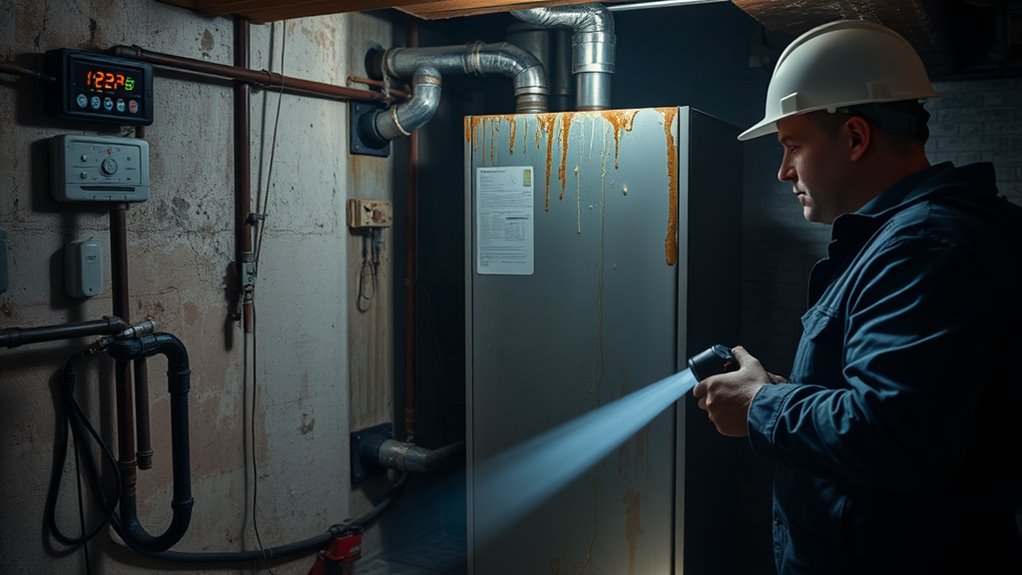
Is Replacing a Boiler a Big Job?
Signs That You Need a Boiler Replacement
If your boiler is over 15 years old, it may be time to contemplate a replacement. Frequent repairs and inconsistent heating output are clear indicators that your system isn't operating efficiently. Recognizing these signs early can save you money and guarantee your home remains comfortable. Additionally, issues like low water pressure can significantly affect boiler performance, making replacement a more viable option.
Age of Boiler
As your boiler ages, the likelihood of inefficiency and breakdowns increases, making it essential to recognize the signs that indicate a replacement is necessary. The average boiler lifespan typically ranges from 10 to 15 years, depending on the type and maintenance. If your boiler is nearing this age, you should assess its efficiency. Decreased heating output, rising energy bills, and strange noises can all signal that your system is no longer operating at peak performance. Additionally, if you notice inconsistent heating throughout your home, it may suggest that your boiler is struggling to maintain efficiency. In such cases, investing in a new boiler can enhance your home's energy efficiency and reliability, ultimately offsetting costs in the long run. Moreover, compliance with safety regulations is crucial to ensure the safe operation of your new system.
Frequent Repairs Needed
When you find yourself frequently calling for repairs, it's a clear indicator that your boiler may be nearing the end of its lifespan. Frequent breakdowns not only disrupt your daily routine but also signal underlying issues that can escalate over time. If you're noticing that repairs are becoming a regular occurrence, it's crucial to evaluate the associated repair costs. High expenses from continual maintenance can quickly surpass the price of a new boiler. Additionally, a boiler that requires constant repairs indicates inefficiency, potentially increasing your energy bills. In such cases, it's wise to contemplate a replacement. Investing in a new boiler could save you from ongoing repair headaches and improve your home's heating efficiency. Regular boiler maintenance is essential to prevent issues and ensure peak efficiency, which can also help in assessing the need for a replacement.
Inconsistent Heating Output
Inconsistent heating output often signals that your boiler is struggling to function properly, and this can lead to uncomfortable temperatures in your home. If you find certain rooms are too cold while others are too hot, your boiler's heating efficiency may be compromised. This issue can stem from various factors, including age, sediment buildup, or mechanical failure. As a result, your overall comfort levels decrease, forcing you to rely more on auxiliary heating sources, which can increase energy costs. Regular maintenance might help, but if problems persist, it's likely time to evaluate a replacement. An updated boiler can provide improved heating efficiency, ensuring consistent warmth and comfort throughout your living space. Additionally, investing in energy-efficient heating systems can significantly reduce your carbon footprint and energy consumption. Don't ignore these signs; your comfort depends on it.
Factors Affecting the Complexity of Boiler Replacement
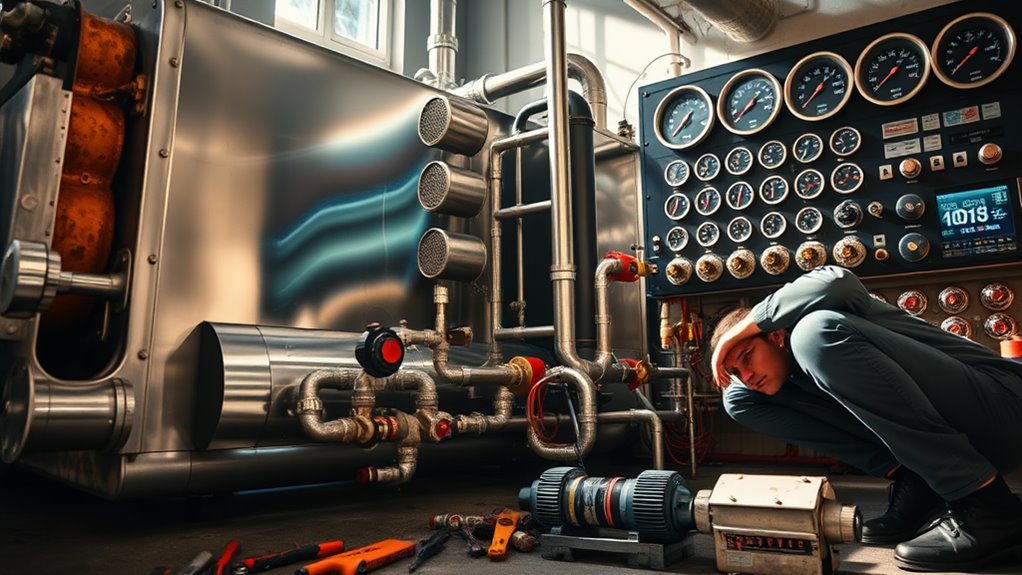
When replacing a boiler, several factors add to the complexity of the process. You'll need to take into account the type of boiler you select, challenges related to the installation location, and any compatibility issues with your existing heating system. Each of these elements can greatly impact the efficiency and effectiveness of your new boiler. Additionally, understanding common boiler error codes can help you anticipate potential issues during and after the installation process.
Boiler Type Selection
How do you determine the right boiler type for your needs? Start by evaluating boiler efficiency, which greatly impacts your energy costs and heating performance. Consider the energy source—natural gas, oil, electricity, or renewable options—each with distinct benefits and drawbacks. For instance, gas boilers typically offer higher efficiency and lower operational costs compared to oil. Next, think about your heating demands. A combi boiler might suit smaller homes, while larger properties may require a system or regular boiler to meet their needs. Additionally, local regulations and available infrastructure can influence your choice. Regular maintenance helps prevent error codes that can affect boiler performance, ensuring peak performance and savings. Evaluating these factors will help you select the appropriate boiler type that aligns with your efficiency goals and energy source preferences, ensuring peak performance and savings.
Installation Location Challenges
While selecting a suitable installation location for your new boiler, several challenges can complicate the replacement process. Installation obstacles often arise from existing infrastructure, such as plumbing and electrical systems, which may restrict where you can place the unit. Additionally, space limitations can considerably impact your options. If the area is cramped or has limited access, it may require more effort to install the boiler safely and effectively. You also need to take into account ventilation requirements and local building codes, which can further constrain your choices. These factors can increase installation time and costs, so it's crucial to evaluate your space thoroughly before proceeding with the replacement to guarantee a smooth installation process. Furthermore, understanding error codes associated with the boiler can aid in identifying potential issues during installation.
System Compatibility Issues
What challenges might arise from system compatibility issues during a boiler replacement? Firstly, you'll need to conduct compatibility assessments to guarantee your new boiler aligns with existing components, like radiators and piping. If your current system is outdated or inefficient, the new boiler might not achieve ideal system efficiency. Additionally, differences in fuel types or pressure settings can complicate the integration process, leading to potential performance issues. You might also face electrical or control system mismatches that require further modifications. It's essential to evaluate these factors upfront, as addressing compatibility issues post-installation can greatly increase costs and time delays. Proper planning and consultation with professionals can help mitigate these challenges and guarantee a smoother replacement process. Moreover, understanding the benefits of commercial heat pumps can provide an alternative solution that may better suit your building's heating and cooling needs.
The Boiler Replacement Process Explained
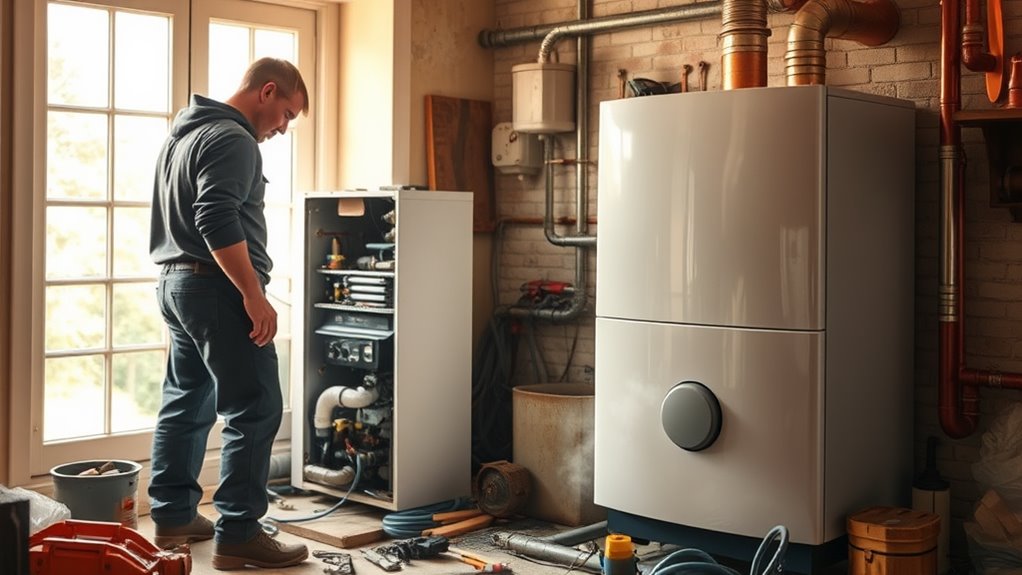
When you're ready to replace your boiler, understanding the process is essential to guarantee a smooth changeover and maximum efficiency. Here's a brief overview of what to expect:
- Assessment: Evaluate your current system and decide on the appropriate boiler types for your needs.
- Preparation: Gather all necessary tools and materials, ensuring compliance with local codes.
- Removal: Safely disconnect and remove the old boiler, paying attention to any hazards.
- Installation: Follow best installation tips, including proper venting and piping connections for peak performance. Regular preventative maintenance on your new boiler will be crucial to prolonging its lifespan and ensuring efficient operation.
Choosing the Right Boiler for Your Home
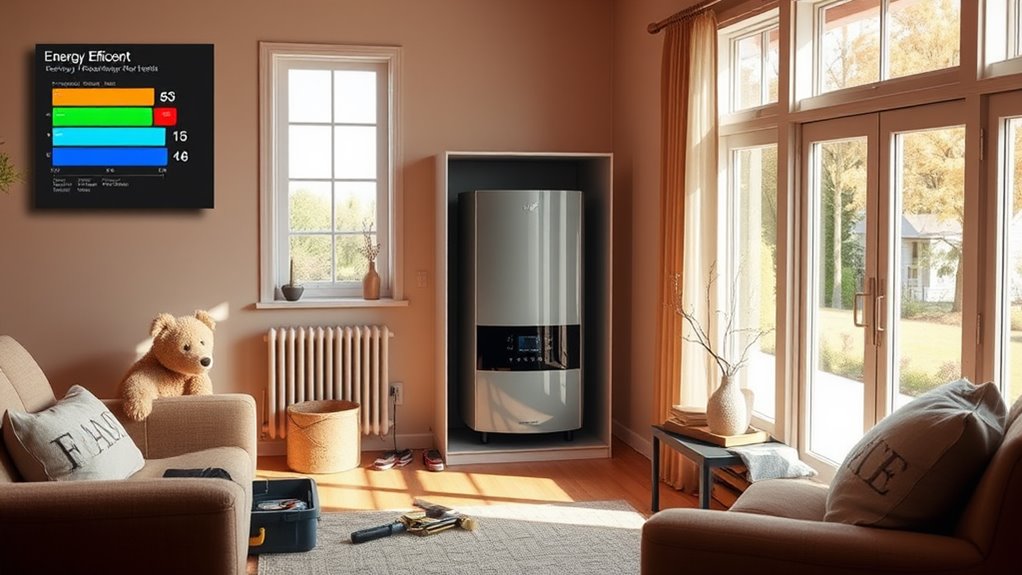
How do you determine the best boiler for your home? Start by evaluating your heating needs based on the size of your space and the number of occupants. Consider the type of fuel available—gas, oil, or electricity—affecting both efficiency and cost. Look for a boiler with high boiler efficiency ratings, as this translates to better performance and lower energy bills. Evaluate different models, focusing on their energy savings features, such as modulating burners or smart controls. Don't forget to factor in maintenance requirements and warranties. Finally, consult with a professional to verify your chosen boiler meets local codes and can adequately support your heating demands. Making an informed choice can enhance comfort while optimizing energy efficiency.
Preparing Your Home for a Boiler Replacement
After selecting the right boiler for your home, preparing for its replacement is essential to guarantee a smooth installation process. Proper home preparation involves several key steps, including space clearing to allow easy access for technicians. Here's what you should do:
- Clear the area around the existing boiler, including furniture and personal items.
- Ascertain that pathways to the boiler are unobstructed for safe movement and equipment transport.
- Check for any potential hazards, such as leaks or electrical issues, and address them beforehand.
- Inform your household about the replacement schedule to minimize disruptions.
Cost Considerations for Boiler Replacement
Understanding the costs associated with boiler replacement is essential for effective budgeting and planning. The total expense typically includes the boiler unit, installation, and any necessary modifications to your existing system. Prices can range from $3,000 to $7,000, depending on the boiler type and installation complexity. To manage these costs, consider exploring various financing options. Some suppliers offer payment plans or loans that can spread the expense over time, making it easier to fit into your budget planning. Additionally, factoring in potential energy savings from a more efficient unit can offset initial costs in the long run. Always obtain multiple quotes to guarantee you're making an informed decision tailored to your financial situation.
Frequently Asked Questions
How Long Does a Boiler Replacement Typically Take?
Boiler installation duration typically ranges from a few hours to a full day, depending on the system and complexity. On average, you can expect a boiler replacement timeline of 4 to 8 hours for a straightforward swap of an old unit with a new one. However, if additional modifications to plumbing or electrical systems are required, it might extend the timeline. Always consult a professional for a more accurate estimate based on your specific situation.
Can I Replace My Boiler Myself?
You might think about replacing your boiler yourself, but it's vital to reflect on the DIY risks involved. Boiler installation requires specific knowledge of plumbing and gas systems, as improper handling can lead to dangerous situations, including leaks or explosions. Additionally, local regulations often mandate professional installation for safety and compliance. It's usually safer and more efficient to hire a qualified technician who can guarantee everything's done correctly and up to code.
What Permits Are Needed for Boiler Replacement?
When replacing a boiler, you need to be aware of the permit requirements in your area. Most locations require permits to guarantee compliance with installation regulations. Check with your local building authority for specific rules, as they can vary widely. You'll likely need a plumbing and mechanical permit, and possibly an electrical one if your boiler connects to the electrical system. Always verify you've completed this step before starting your installation.
Will My Home Be Without Heat During Replacement?
During your boiler replacement, your home might be without heat for a short period. However, most professionals provide temporary heating solutions to minimize discomfort. The installation timeline varies, but typically, it can take a few hours to a full day, depending on the system and complexity. It's crucial to discuss this with your contractor beforehand to guarantee you understand the process and any temporary measures they'll implement to keep you warm during the installation.
Are There Any Warranties for New Boilers?
When you purchase a new boiler, you'll often find various boiler warranties available. Most manufacturers offer warranty coverage that typically lasts from one to ten years, depending on the model and brand. This coverage usually includes parts and, in some cases, labor. It's crucial to understand the specifics of your warranty, including any conditions that could void it, to guarantee you're fully protected in case of future issues with your boiler.
Summary
In summary, replacing a boiler can indeed be a significant undertaking, but understanding the process helps demystify it. Evaluating your current system and recognizing signs for replacement are essential first steps. By considering factors like installation complexity and choosing the right model, you can streamline the process. Proper preparation and awareness of costs will further ease the shift. With careful planning, you can guarantee your home remains warm and efficient throughout the replacement journey.

